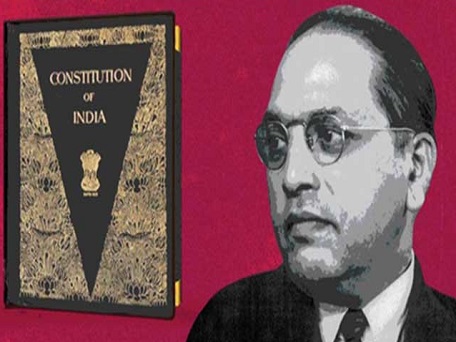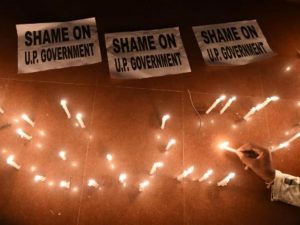
Another death anniversary of Babasaheb Ambedkar has passed without any notable celebrations or paying justifiable salute to the values he stood for. There is nothing embarrassing in it, given that the Hindutva forces who occupy the driving seats of Indian democracy, are busy preparing the ground for the upcoming election by focusing on their typical Ram temple slogan. Those who are aware of Ambedkar’s vision of Indian democracy, will not be surprised that the Sangh is not making any rhetoric, (if not in the form of massive statues or special day announcement), in the name of Ambedkar. More than anyone, they are determined to keep the memory of Babasaheb away from the conscience of the public of this country. There is nothing but contradictions between saffron and Babasaheb.
Ambedkar has charted out the conditions, implementing which can lead to the successful working of modern democracy in India. His first and foremost thought was that there should not be any glaring inequalities in the society. He demanded that there should not be an oppressed class in the society and any situation in which one class gets all the privileges while the other class is destined to carry the entire burden, has to be erased completely from society. Today’s India, however, has emerged as a country with the largest amount of income inequality in the world. The unequal share of wealth among its population has only multiplied under Modi’s regime.
Each time Modi wrote off the huge debts taken by corporates from India’s leading public banks, Ambedkar’s idea of an equal society, which is necessary for the working of modern democracy, is snubbed. Each time the subsidiary for poor or the minimum support price for farmers for their agricultural products, or even the fellowships of students from marginalised sections are denied, Ambedkar’s ideas are killed. The Oxfam study has revealed that 1% of the rich people alone own 73% of the total wealth in India. The same study has showed that the amount of accumulated wealth of only 57 billionaires in India is equivalent to the amount that the bottom 70% of Indian population holds. According to a study by the Centre for the Sustainable Employment of the Azim Premji University, the headline rate of unemployment reached 5% in 2015, with youth unemployment being 16%. This rate of unemployed Indians is the highest in last two decades. In the 119 countries’ list based on the global hunger index, prepared by the Food Policy Research Institute (IFPRI), India has been positioned at 100th.
Ambedkar recognised the presence of vibrant opposition as a condition for the successful existence of democracy. He wanted the government to justify its actions to those who do not belong to the ruling party. No fundamental change could occur without such scrutiny and flexibility, and monarchies would then be re-represented in such a system of democracy. The situation of today’s parliament has made Ambedkar’s fears come true. Modi has emerged as the prime minister who has attended parliament the least number of times in the history of independent India. Even the functioning of parliament has been put on question with many of its duties being sabotaged. The number of parliament sessions has been going down year after year ever since this government came to office in 2014. Last year, the number was just 57, which is 13 days less than the previous year. All the decisions which had long lasting implications were taken without any consultation in the parliament, “Note-bandi” topping the list.
Ambedkar demanded equality in law and administration to ensure the meaningful running of democracy. He said that the administration must not be interfered by the government. He further stated that the prime function of the government is to lay down policies and not to interfere and make any discrimination. All institutions, from Universities to the premier educational institutions to the bodies such as election commissions are full of people whose only credential is their obedience to the saffron brigade. Merit is sabotaged and due procedures are scrapped. The only criterion that is necessary to get appointed to positions of power is loyalty towards the ruling regime. Recently, the RBI governer Urjit Patel stepped down, leaving out a lot of questions, amidst the quarrels between RBI and Modi government over a wide range of issues. Ambedkar would have been disappointed about the country he drafted the constitution for.
Ambedkar defined democracy as “a form of government whereby revolutionary changes in the economic and social life of the people are brought about without bloodshed’. On the one hand, it has been hinted that, with the Bulandshahr riot in UP, the Hindutva brigade has launched their march to power by diverting the real issues to communal riots and massacres. On the other hand, there is a competition between the BJP ruled states on “who will build the tallest statue?” While Ambedkar talked about revolutionary changes to incorporate values of “liberty, equality and fraternity”, something paradoxical is happening in the Modi era. Those who use positions of power to split its population and push them to the imprisonment of hatred will reserve no space in their hearts to practice what Ambedkar meant by democracy.
Ambedkar was a champion of constitutional morality. He identified that the existence of mere legal provisions, contained in the constitution, will serve the role of just a skeleton. He reminded that the flesh of that skeleton is to be found in what we call constitutional morality. We hardly find public carrying this constitutional morality. This can be seen by the Sangh’s reaction to the recent Supreme Court verdict on Sabarimala regarding the entry of women into the temple irrespective of their age.
Ambedkar said, “Democracy is in a free government, a government under which people are free to carry on with their social aspects of life without interference of law, or if law has to be made, then the law-maker expects that society will have enough morality in it to make the law a success.” It is precisely this morality that the Sangh does not want to nurture in this society. As long as our society is incapable of internalising such a morality, no matter what legal provisions our constitution offers, we will continue having that unbridgeable distance with the democracy articulated by Ambedkar. And our time in history will be marked not in the name of the constitution, but for mob lynchings and caste atrocities.




